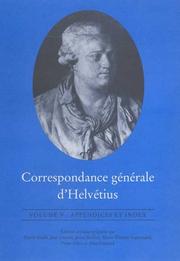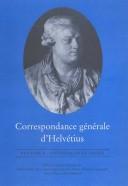| Listing 1 - 4 of 4 |
Sort by
|
Dissertation
Abstract | Keywords | Export | Availability | Bookmark
 Loading...
Loading...Choose an application
- Reference Manager
- EndNote
- RefWorks (Direct export to RefWorks)


ISBN: 0729402509 9780802089915 9780802027788 9780802042859 0729402517 0802042856 9781442673519 1442673516 1282028332 9786612028335 1442638834 1442654260 Year: 1981 Volume: 41,51,63 Publisher: Toronto Buffalo University of Toronto Press
Abstract | Keywords | Export | Availability | Bookmark
 Loading...
Loading...Choose an application
- Reference Manager
- EndNote
- RefWorks (Direct export to RefWorks)
This is the fourth of five volumes of the letters of the French philosopher Claude Adrien HelvTtius (1715-1771), author of the controversial De l'Esprit (1758). Featuring the correspondence of Mme HelvTtius, nTe Anne Catherine de Ligniville (1722-1800), in the years following her husband's death, this volume also includes letters by and to HelvTtius discovered since the publication of the first three volumes.Mme HelvTtius enjoyed an active widowhood, welcoming to her salon in Auteuil a group of intellectuals who came to be known as the IdTologues. A close friend of Benjamin Franklin, she was involved in political events before and during the French Revolution, as well as in Napoleon's coup d'Ttat. In the last letter of the series her grandson describes her burial in her garden, which took place without religious or revolutionary ceremony in the presence of all her favourite pets.Most of the newly discovered letters are addressed to HelvTtius by figures as important as d'Alembert, Boulanger, Chastellux, Saint-Lambert, Servan, Thieriot, and Trublet. Some of these complete an existing exchange, others provide dates for letters already published.The fifth and final volume will be devoted primarily to a comprehensive index. It will also include a chronological list of all the letters, corrections and modifications, and other useful material.
Philosophers --- Philosophes --- Helvétius, --- Helvétius, Anne-Catherine, --- Helvétius, Anne Catherine de Ligniville d'Autricourt, --- De Ligniville d'Autricourt, Anne-Catherine, --- Ligniville d'Autricourt, Anne-Catherine de, --- D'Autricourt, Anne-Catherine de Ligniville, --- Autricourt, Anne-Catherine de Ligniville d', --- Helvétius, Claude-Adrien, --- Gelʹvet︠s︡iĭ, K., --- Гельвеций, К., --- Schweitzer, Claude-Adrien, --- Helwecjusz, --- Helvétius, Claude-Adrien --- Correspondance --- Helvétius, Anne-Cathérine --- Correspondence --- France --- Helvétius --- Correspondance.

ISBN: 0802055176 0802027784 0802056415 0802089917 9781442673502 1442673508 9780802055170 9780802056412 9780802027788 0729405532 9780729405539 1282039490 9786612039492 1442638818 1442638826 1442683856 0802087191 1442638842 9786611992804 1442673524 1281992801 0802086675 9780802089915 9781442673526 0729406164 9780729406161 9781442683853 1442654244 1442654252 1442654279 Year: 2004 Volume: 41, 51, 63 Publisher: Toronto: University of Toronto press,
Abstract | Keywords | Export | Availability | Bookmark
 Loading...
Loading...Choose an application
- Reference Manager
- EndNote
- RefWorks (Direct export to RefWorks)
The third volumes of the Correspondance generale d'Helvetius offers readers further insight into a variety of aspects of life in eighteenth-century France. Claude-Adrian Helvetius (1715-71) was a wealthy and high-ranking member of French society. He was acquainted with the leading political and social figures of his time and, through family, with the court and government which he occasionally served in a diplomatic capacity. Philosopher, encyclopedist, and author of the explosive De l'Esprit, he and his wife, Anne Catherine de Ligneville, corresponded with the great and influential throughout Europe. The letters in this volume were written between 1761 and 1774, a period in which Helvetius enjoyed the fruits of his fame, travelled to England (1764) and Prussia (1765), and produced two books, Le Bonheur and De l'homme, which were published after his death.
Philosophers --- Helvetius, --- -Correspondence --- Helvetius --- Philosophes --- Correspondence --- Correspondance --- Helvétius, --- -Scholars --- Helvétius, Claude Adrien, --- LITERARY COLLECTIONS / Letters. --- Helvétius, Claude-Adrien, --- Gelʹvet︠s︡iĭ, K., --- Гельвеций, К., --- Schweitzer, Claude-Adrien, --- Helwecjusz, --- Criticism and interpretation. --- French literature --- English literature --- Monsters in literature --- Literature, Medieval --- Monsters in art --- Littérature anglaise --- Monstres dans la littérature --- Littérature médiévale --- Monstres dans l'art --- History and criticism --- Histoire et critique --- Monsters in literature. --- Monsters --- Monsters in art. --- History and criticism. --- Symbolic aspects --- History --- Philosophers - France - Correspondence --- Helvétius, Claude Adrien, - 1715-1771 --- France. --- Helvetius, Anne-Catherine, --- Bro-C'hall --- Fa-kuo --- Fa-lan-hsi --- Faguo --- Falanxi --- Falanxi Gongheguo --- Farans --- Farānsah --- França --- Francia (Republic) --- Francija --- Francja --- Francland --- Francuska --- Franis --- Franḳraykh --- Frankreich --- Frankrig --- Frankrijk --- Frankrike --- Frankryk --- Fransa --- Fransa Respublikası --- Franse --- Franse Republiek --- Frant͡ --- Frant͡s Uls --- Frant͡sii͡ --- Frantsuzskai͡a Rėspublika --- Frantsyi͡ --- Franza --- French Republic --- Frencisc Cynewīse --- Frenska republika --- Furansu --- Furansu Kyōwakoku --- Gallia --- Gallia (Republic) --- Gallikē Dēmokratia --- Hyãsia --- Parancis --- Peurancih --- Phransiya --- Pransiya --- Pransya --- Prantsusmaa --- Pʻŭrangs --- Ranska --- República Francesa --- Republica Franzesa --- Republika Francuska --- Republiḳah ha-Tsarfatit --- Republikang Pranses --- République française --- Tsarfat --- Tsorfat --- Helvétius, Anne Catherine de Ligniville d'Autricourt, --- De Ligniville d'Autricourt, Anne-Catherine, --- Ligniville d'Autricourt, Anne-Catherine de, --- D'Autricourt, Anne-Catherine de Ligniville, --- Autricourt, Anne-Catherine de Ligniville d', --- Gelʹvet͡siĭ, K.,
Book
ISBN: 9782130551713 2130551718 Year: 2006 Publisher: Paris: Presses Universitaires de France,
Abstract | Keywords | Export | Availability | Bookmark
 Loading...
Loading...Choose an application
- Reference Manager
- EndNote
- RefWorks (Direct export to RefWorks)
Le XVIIIe siècle est l'âge d'or du matérialisme français. Qu'il prolonge la doctrine de la nécessité des événements de Hobbes (d'Holbach), qu'il retourne la théorie des animaux machines contre Descartes pour penser l'homme machine (La Mettrie), qu'il renouvelle l'idée d'une science de l'homme à partir d'une critique de l'intériorité subjective (Helvétius) ou invente de nouveaux modèles (Diderot), on retrouve souvent dans les œuvres les plus importantes la tentative de fournir une explication homogène de la nature, de la société et de l'esprit. Mais cet âge d'or du matérialisme français, tout central qu'il fut dans la pensée des Lumières, n'y fut pourtant pas dominant. C'est pourquoi, outre son aspect proprement théorique, son style est polémique et critique: contre les fictions de la métaphysique, contre l'hypocrisie morale, contre la superstition religieuse. Affrontant directement les pouvoirs ecclésiastique, politique, universitaire, certains textes matérialistes ont vécu, comme on le sait, une vie clandestine et connu une histoire souterraine. Il est question ici de trois matérialistes français majeurs: La Mettrie, Helvétius et d'Holbach. Si ces trois auteurs sont privilégiés, c'est pour remettre au premier plan des œuvres qui ont été parfois éclipsées par l'ombre immense portée par une autre figure importante: Diderot. Mais Diderot n'est bien entendu pas absent du volume. Il se pourrait même que ce soit dans une confrontation avec lui que se dessinent les voies du matérialisme
La Mettrie, Julien Offray de, --- Helvétius, --- Holbach, Paul Henri Thiry, --- Matérialisme. --- French political philosophy --- Materialism --- Philosophers --- Philosophy, French --- French philosophy --- Scholars --- Physicalism --- Animism --- Philosophy --- Positivism --- Dualism --- Idealism --- Mechanism (Philosophy) --- Monism --- Realism --- History --- Lametri, Žiuljenas Ofre, --- Mettrie, Julien Offray de La, --- Lametri, Zhi︠u︡lʹen Ofre, --- La Metrie, --- La Mettrie, Julien Offroy de, --- D'Holbach, Paul Henri Thiry, --- Holbach, Paul Henri Thiery, --- Holbach, Paul Heinrich Dietrich, --- Thiry, Paul Henri, --- Thiery, Paul Henri, --- Thierry, Paul Henri, --- Dietrich, Paul Henri, --- Thyry, Paul Henri, --- Holbach, Paul Thiry, --- Holbach, --- D'Holbach, --- M. D***, --- D***, --- Ancien magistrat, --- Bernier, --- Olbach, --- Orbach, --- Halbach, --- Holbah, Pol, --- Golʹbakh, Polʹ, --- Holbakh, Pol, --- Helvétius, Claude-Adrien, --- Gelʹvet︠s︡iĭ, K., --- Гельвеций, К., --- Schweitzer, Claude-Adrien, --- Helwecjusz, --- Philosophes --- Philosophie française --- Histoire. --- Matérialisme --- Histoire --- 18th century --- Criticism --- Helvétius, Claude Adrien, --- von Holbach, Paul Heinrich Dietrich --- Materialism - France - History - 18th century --- Philosophy, French - 18th century --- Philosophers - France - 18th century --- La Mettrie, Julien Offray de, - 1709-1751 --- Helvétius, Claude Adrien, - 1715-1771 --- Holbach, Paul Henri Thiry, - baron d', - 1723-1789 --- La Mettrie, Julien Offray de (1709-1751) --- Helvétius, Claude-Adrien (1715-1771) --- Holbach, Paul Henri Dietrich (1723-1789 ; baron d') --- Philosophie --- Matérialisme --- Critique et interprétation --- France --- 18e siècle
| Listing 1 - 4 of 4 |
Sort by
|

 Search
Search Feedback
Feedback About UniCat
About UniCat  Help
Help News
News